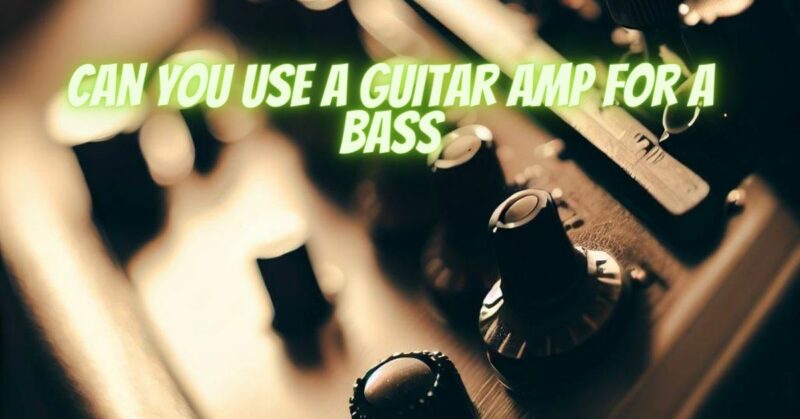In the realm of musical experimentation, the question often arises: Can you use a guitar amp for bass? While traditionally designed for six-stringed counterparts, guitar amplifiers can, in certain situations, be repurposed to handle the lower frequencies of a bass guitar. This article explores the considerations, potential challenges, and creative possibilities that arise when venturing beyond the conventional and employing a guitar amp for bass applications.
Compatibility and Considerations:
1. Impedance Matching:
One of the primary considerations when using a guitar amp for bass is impedance matching. Bass guitars typically output a lower frequency range compared to electric guitars, and using a bass with a lower impedance than the amp’s minimum rating can result in potential damage to the amplifier.
2. Wattage and Power Handling:
Wattage and power handling capacity are crucial factors. Bass frequencies demand more power to reproduce effectively. While a guitar amp may suffice for low-volume practice, pushing it to its limits can lead to distortion, clipping, and potential damage. Matching the amp’s wattage to the requirements of the bass ensures a cleaner and more controlled sound.
Tonal Considerations:
3. Frequency Response:
Guitar amps are tailored to emphasize the midrange frequencies crucial for guitar tones. Bass guitars, on the other hand, rely heavily on low-end frequencies. Using a guitar amp for bass may result in a loss of deep bass response, making it challenging to achieve the full spectrum of bass tones.
4. Speaker Size and Configuration:
The size and configuration of the amp’s speaker(s) significantly influence the resulting sound. Bass frequencies require more air movement, and bass amps often feature larger speakers or multiple speakers to accommodate this demand. Using a guitar amp with smaller speakers may limit the reproduction of low frequencies.
Potential Challenges:
5. Overdriving and Distortion:
Pushing a guitar amp beyond its intended capacity with a bass guitar can lead to overdriving and distortion. While controlled distortion can be a creative choice for certain genres, excessive distortion can damage both the amp and speakers.
6. Speaker Damage:
Bass frequencies exert more physical force on speakers than guitar frequencies. Using a guitar amp for bass at high volumes may stress the amp’s speakers, leading to potential wear, tear, and even speaker damage.
Creative Possibilities:
7. Artistic Experimentation:
Despite the technical considerations, using a guitar amp for bass can be an artistic choice. In certain situations, the unique tonal characteristics of a guitar amp may contribute to a distinct and unconventional sound, particularly in genres that embrace experimentation and sonic diversity.
8. Low-Volume Practice:
For low-volume practice sessions, using a guitar amp for bass can be a practical solution, especially for beginners or those seeking a cost-effective option. It allows for quiet exploration of bass techniques without the need for additional equipment.
While using a guitar amp for bass comes with its set of challenges and considerations, it is not a strict taboo. The decision largely hinges on the specific context, the desired sonic outcome, and the willingness to navigate potential limitations. As musicians venture beyond the conventional boundaries of amplification, the intersection of creativity and practicality invites exploration, offering a nuanced perspective on the possibilities that arise when breaking free from established norms in pursuit of unique and uncharted sonic territories.


